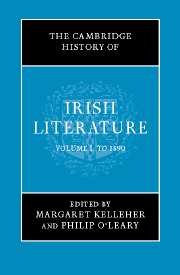Book contents
- Frontmatter
- Introduction
- 1 The literature of medieval Ireland to c. 800: St Patrick to the Vikings
- 2 The literature of medieval Ireland, 800–1200: from the Vikings to the Normans
- 3 The literature of later medieval Ireland, 1200–1600: from the Normans to the Tudors
- 4 Literature in English, 1550–1690: from the Elizabethan settlement to the Battle of the Boyne
- 5 Literature in Irish, c.1550–1690: from the Elizabethan settlement to the Battle of the Boyne
- 6 Prose in English, 1690–1800: from the Williamite wars to the Act of Union
- 7 Poetry in English, 1690–1800: from the Williamite wars to the Act of Union
- 8 Literature in Irish, 1690–1800: from the Williamite wars to the Act of Union
- 9 Theatre in Ireland, 1690–1800: from the Williamite wars to the Act of Union
- 10 Irish Romanticism, 1800–1830
- 11 Prose writing and drama in English, 1830–1890: from Catholic emancipation to the fall of Parnell
- 12 Poetry in English, 1830–1890: from Catholic emancipation to the fall of Parnell
- 13 Literature in Irish, 1800–1890: from the Act of Union to the Gaelic League
- 14 Historical writings, 1690–1890
- 15 Literature and the oral tradition
- Guide to major subject areas
- Index
- References
15 - Literature and the oral tradition
Published online by Cambridge University Press: 28 March 2008
- Frontmatter
- Introduction
- 1 The literature of medieval Ireland to c. 800: St Patrick to the Vikings
- 2 The literature of medieval Ireland, 800–1200: from the Vikings to the Normans
- 3 The literature of later medieval Ireland, 1200–1600: from the Normans to the Tudors
- 4 Literature in English, 1550–1690: from the Elizabethan settlement to the Battle of the Boyne
- 5 Literature in Irish, c.1550–1690: from the Elizabethan settlement to the Battle of the Boyne
- 6 Prose in English, 1690–1800: from the Williamite wars to the Act of Union
- 7 Poetry in English, 1690–1800: from the Williamite wars to the Act of Union
- 8 Literature in Irish, 1690–1800: from the Williamite wars to the Act of Union
- 9 Theatre in Ireland, 1690–1800: from the Williamite wars to the Act of Union
- 10 Irish Romanticism, 1800–1830
- 11 Prose writing and drama in English, 1830–1890: from Catholic emancipation to the fall of Parnell
- 12 Poetry in English, 1830–1890: from Catholic emancipation to the fall of Parnell
- 13 Literature in Irish, 1800–1890: from the Act of Union to the Gaelic League
- 14 Historical writings, 1690–1890
- 15 Literature and the oral tradition
- Guide to major subject areas
- Index
- References
Summary
Introduction
The title of this chapter recognises that the Irish literary tradition encompasses both ‘literature’, which a modern audience generally thinks of as prose or poetry that is attributable, datable, written and fixed in one authoritative form, and ‘oral tradition’, which a modern audience rarely thinks of at all, but which encompasses prose, poetry, sayings, superstitions and many other genres of folklore, whose composers may or may not be known, whose date of creation may or may not be estimated, and which circulates in multiple versions through the interaction of performer and listener. Such distinctions between them – and there are many more – imply that literature and oral tradition exist discretely, neither one affecting nor being affected by the other. But what one person writes may be read aloud and heard by others, just as what one person speaks may be written and read silently by others. Even a quick survey of the Irish literary tradition confirms that such interaction has occurred for centuries.
The concept of literature described above is peculiar to members of a highly literate society, in which the majority are taught to read, write and rely on print to guarantee the accuracy, longevity and availability of information. Literature in oral form, however, is familiar to populations in virtually all places and times. In pre-Christian Ireland, literature and all other knowledge worth retaining may well have been memorised by professional scholars. Evidence from the Christian period shows that jurists, historians, physicians and poets secured their data ‘in repetitions and mnemonics, in alliterations, rhymes, and formulaic closures’ to ease its passage and ensure its fidelity from one generation to the next.
- Type
- Chapter
- Information
- The Cambridge History of Irish Literature , pp. 633 - 676Publisher: Cambridge University PressPrint publication year: 2006
References
- 2
- Cited by



